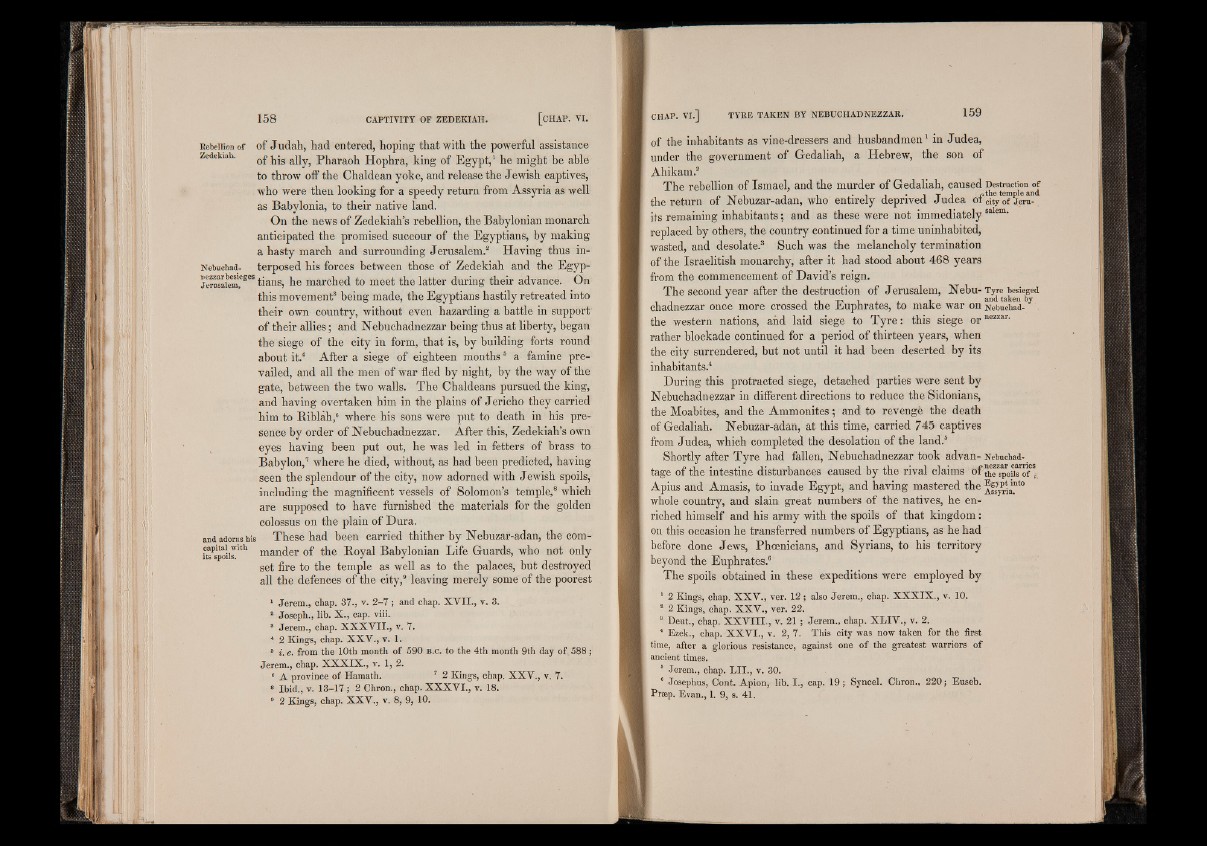
Rebellion of of Judah, had entered, hoping that with the powerful assistance
Zedefaab. 0f ^¡s Pharaoh Hophra, king of Egypt,1 he might be able
to throw off the Chaldean yoke, and release the Jewish captives,
who were then looking for a speedy return from Assyria as well
as Babylonia, to their native land.
On the news of Zedekiah’s rebellion, the Babylonian monarch
anticipated the promised succour of the Egyptians, by making
a hasty march and surrounding Jerusalem.8 Having thus in-
Neboebad. terposed his forces between those of Zedekiah and the Egyp-
jernsaiem,egeS tians, he marched to meet the latter during their advance. On
this movement3 being made, the Egyptians hastily retreated into
their own country, without even hazarding a battle in support
of their allies; and Nebuchadnezzar being thus at liberty, began
the siege of the city in form, that is, by building forts round
about it.4 After a siege of eighteen months5 a famine prevailed,
and all the men of war fled by night, by the way of the
gate, between the two walls. The Chaldeans pursued the king,
and having overtaken him in the plains of Jericho they carried
him to Riblah,6 where his sons were put to death in his presence
by order of Nebuchadnezzar. After this, Zedekiah’s own
eyes having been put out, he was led in fetters of brass to
Babylon,7 where he died, without, as had been predicted, having
seen the splendour of the city, now adorned with Jewish spoils,
including the magnificent vessels of Solomon’s temple,8 which
are supposed to have furnished the materials for the golden
colossus on the plain of Dura,
and adorns his These had been carried thither by Nebuzar-adan, the com-
itePspoiiirltl1 mander of the Boyal Babylonian Life Guards, who not only
set fire to the temple as well as to the palaces, but destroyed
all the defences of the city,9 leaving merely some of the poorest
1 Jerem., chap. 37., v. 2 -7 ; and chap. X V II., v. 3.
8 Joseph., lib. X., cap. viii.
3 Jerem., chap. X X X V II., v. 7.
4 2 Kings, chap. X X V ., v. 1.
5 i. e. from the 10th month of 590 B.C. to the 4th month 9th day o f 588;
Jerem., chap. X X X IX ., v. 1, 2.
6 A province of Hamath. 7 2 Kings, chap, X X V ., v. 7.
8 Ibid., v. 13-17; 2 Chron., chap. X X X V I., v. 18.
9 2 Kings, chap. X X V ., v. 8, 9, 10.
of the inhabitants as vine-dressers and husbandmen1 in Judea,
under the government of Gedaliah, a Hebrew, the son of
Ahikam.8
The rebellion of Ismael, and the murder of Gedaliah, caused Destruction of
the return of Nebuzar-adan, who entirely deprived Judea of city of jeru-
its remaining inhabitants ; and as these were not immediately salem‘
replaced by others, the country continued for a time uninhabited,
wasted, and desolate.3 Such was the melancholy termination
of the Israelitish monarchy, after it had stood about 468 years
from the commencement of David’s reign.
The second year after the destruction of Jerusalem, Nebu- Tyre besieged
chadnezzar once more crossed the Euphrates, to make war on Nebuchad- y
the western nations, and laid siege to Tyre: this siege o rnezzar-
rather blockade continued for a period of thirteen years, when
the city surrendered, but not until it had been deserted by its
inhabitants.4
During this protracted siege, detached parties were sent by
Nebuchadnezzar in different directions to reduce the Sidonians,
the Moabites, and the Ammonites ; and to revengè the death
of Gedaliah. Nebuzar-adan, at this time, carried 745 captives
from Judea, which completed the desolation of the land.6
Shortly after Tyre had fallen, Nebuchadnezzar took advan- Nebuchad-
tage of the intestine disturbances caused by the rival claims of ^ “ spoUsTf^.
Apius and Amasis, to invade Egypt, and having mastered the f
whole country, and slain great numbers of the natives, he enriched
himself and his army with the spoils of that kingdom :
on this occasion he transferred numbers of Egyptians, as he had
before done Jews, Phoenicians, and Syrians, to his territory
beyond the Euphrates.6
The spoils obtained in these expeditions were employed by
1 2 Kings, chap. X X V ., ver. 12 ; also Jerem., chap. X X X IX ., v. 10.
2 2 Kings, chap. X X V ., ver. 22.
8 Deut., chap. X X V I I I ., v. 21 ; Jerem., chap. X L IV ., v. 2.
4 Ezek., chap. X X V I., v. 2, 7. This city was now taken for the first
time, after a glorious resistance, against one of the greatest warriors of
ancient times.
5 Jerem., chap. L I I ., v. 30.
8 Josephus, Cont. Apion, lib. I., cap. 19 ; Syncel. Chron., 220 ; Euseb.
Præp. Evan., 1. 9, s. 41.